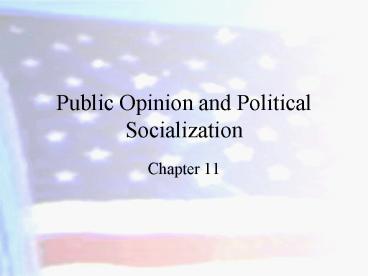Public Opinion and Political Socialization PowerPoint PPT Presentation
1 / 29
Title: Public Opinion and Political Socialization
1
Public Opinion and Political Socialization
- Chapter 11
2
Political Socialization
- A learning process through which we acquire our
ideas, opinions, and beliefs about politics. - It never really ends.
3
Major Agents of Political Socialization
- Family
- School
- Peers
- Mass Media
- Events
- Social Groups
4
Racial and Ethnic Attitudes on Selected Issues
5
Gender Differences on Political Issues
6
Through Political Socialization
- We eventually form an Ideology
- This ideology is our set of core beliefs about
politics. - It is a foundation from which we judge everything
else about politics.
7
Our core ideology is always the last thing to
change. We will usually change lesser opinions
first.
- I will try to provide an example.
8
How do we form opinions?
- Ideology
- Personal Interests
- Political Knowledge
- Cues from leaders
9
Political Scientists are somewhat worried by
surveys
- Which show declining levels of political
knowledge. - For example, less than 30 of Americans surveyed
in 2004 knew who their Representative was in the
U.S. House.
10
So if you take political knowledge outwhat are
we left with?
- Ideology
- Personal Interests
- Cues from leaders
11
Keep in mind that cues from leaders can include
opinion leaders.
12
Do you think that this has any connection to
current politics?
13
Is it easier to take a political position by
relying on ideology?
- What must one do to take a stand relying on the
other areas?
14
What about the level of certainty with an
ideology?
- Does my level of conviction affect my likeliness
to compromise or discuss topics openly?
15
Would a high level of ideological conviction make
me a better teacher?
16
Would a high level of ideological conviction make
you a better student?
17
Does a high level of ideological conviction make
us better citizens in a democracy?
18
What is Public Opinion?
- Public opinion is 'what the people think about an
issue or set of issues at any given point in
time' and opinions are normally measured by
opinion polls.
19
How We Measure Public Opinion
- In order for a poll to be reliable, it must have
a random sample.
20
The easiest way to poll the U.S. is by random
telephone survey.
21
Public Opinion Polls
- Polls are interviews or surveys of a sample of
citizens used to estimate how the public feels
about an issue or set of issues.
22
(No Transcript)
23
Measuring Public Opinion
- In general, do not trust a poll that does not
tell you the question wording, the sampling
method, and the ways in which respondents were
contacted. - Reputable pollsters will also tell you the number
of respondents (the 'n') and the error rate ( or
- 5). - Any poll that tells you to call 555-5554 for yes
and 555-5555 for no is unscientific and
unreliable. This is not a random sample at all!
24
Types of Polls
- Tracking polls--continuous surveys that enable a
campaign to chart its daily rise and fall in
popularity. These may be a decent measure of
trends. - Exit polls--polls conducted at polling places on
election day.
25
Some social scientists have experimented with
- Deliberative polls--a new kind of poll first
tried in 1996. - A relatively large scientific sample of Americans
(600) were selected for intensive briefings,
discussions, and presentations about issue
clusters including foreign affairs, the family,
and the economy.
26
Who uses polls?
- Politicians
- Political Parties
- Interest Groups
27
Why?
- To help campaign strategy.
- To lobby members of government.
- Because the results are private.
- The poll can be conducted at any time.
- The poll can ask specific questions for the
candidate or party.
28
Polls do not do well at
- Measuring intensity of an opinion.
- They also have problems with
- Providing an optimum range of responses.
29
Recently, pollsters say it is becoming harder to
do phone surveys.
- Rise of cell phone use
- Do not call list
- Public anger over intrusion

